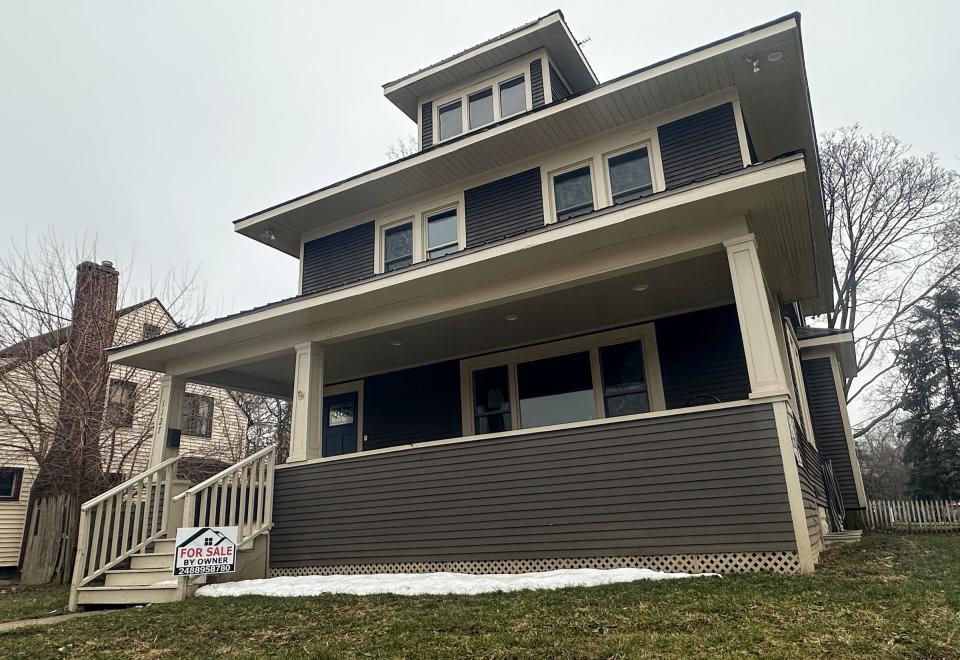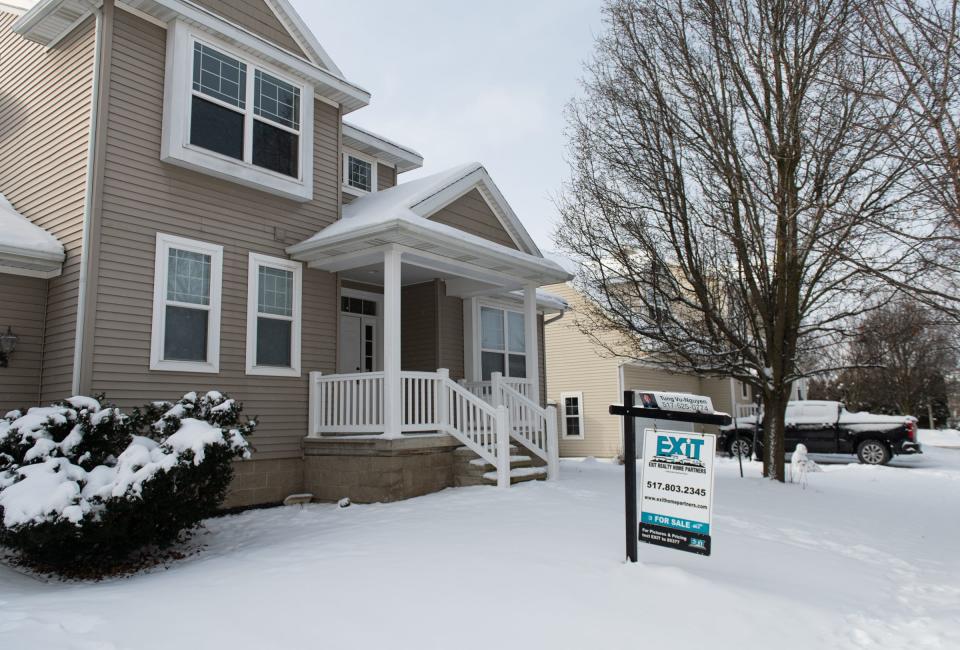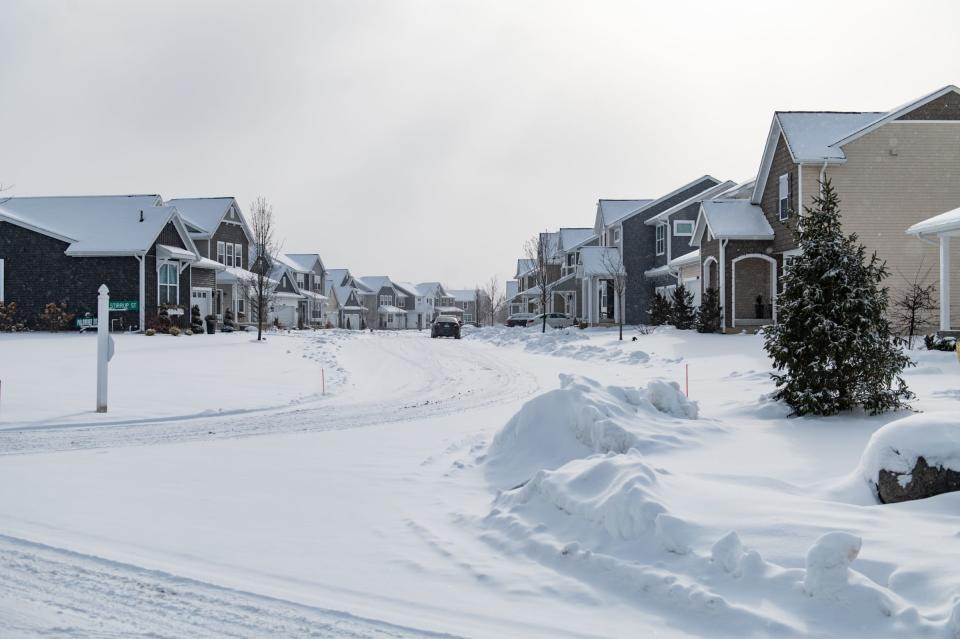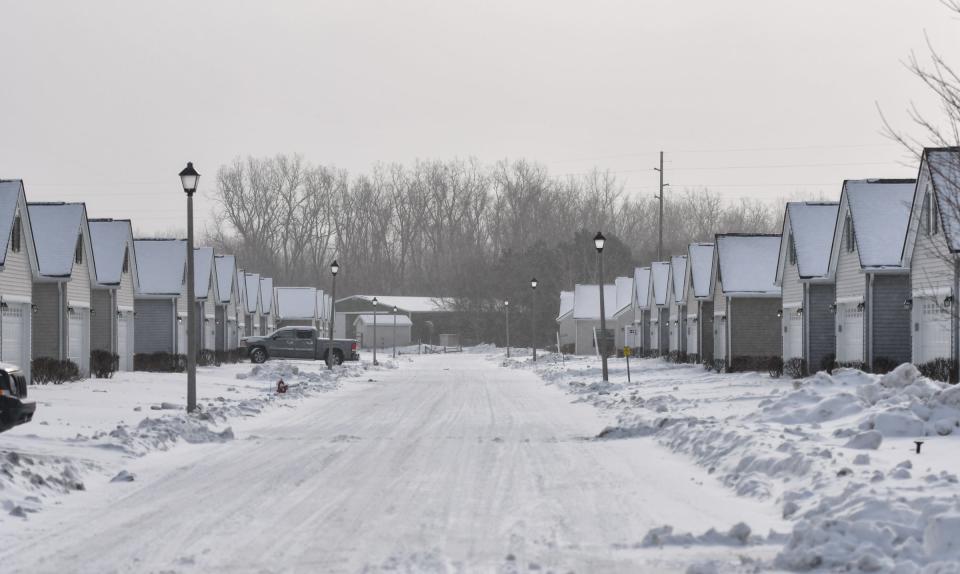Should you buy or sell in Lansing? What to expect from the real estate market
LANSING — Priced at $255,000, a Roundtop Road home with vaulted ceilings, hardwood floors and an address within the Grand Ledge Public Schools district hosted a busy open house on Sunday.
Realtor Laura Guild warned that serious lookers should drop their highest and best offers, because the house was likely to be sold fast.
Patrick and Pat St. George, a retired couple now living in a Delta Township condominium, refused to get in a bidding war. They aren't ready yet, having just started looking for a new home, one where they said they can “age in place.” Their wish list: A home that at minimum has a laundry on the first floor, good accessibility features and a price point within their range.
Patrick, 81, and Pat, 79, are hopeful since they feel more fortunate financially than young professionals starting out and paying off years of student loan debt.
“Everybody says the economy sucks and that the interest rates are too high and it’s the worst time in the world to sell your house. The flip side is offers are going in just bam, bam, bam,” Patrick said.
The St. Georges may have to look longer than they expect to get a home with those features. Then again, they may not.
The residential real estate market in Greater Lansing is expected to have slightly more homes sold at modestly higher prices than 2023, although what the Federal Reserve does with interest rates could alter the difference, experts said.
Regardless, don’t expect a return to the skyrocketing housing prices seen in 2020 and 2021 when interest rates briefly dropped below 3%, the lowest in many years.

About 85% of mortgage holders are locked into sub-5% interest rates, which kept many homeowners from selling their home and buying another at interest rates that peaked at 7.8% the week ending Oct. 26 and fell to an average of 6.6% by Dec. 28, according to Freddie Mac.
A Realtors.com forecast calls for a 1.2% increase in home sales across the Greater Lansing region, with prices expected to rise by 6.2% compared to 2023 prices.
"The higher rates affect the home buying power and there's a housing shortage," said Doug Petroff, president of the Greater Lansing Association of Realtors. "When there's an egg shortage, the price of eggs goes up. Same with housing, except it's more expensive. We have a lack of inventory in the local area."
Average home sale prices continue to rise

Average home sales prices in Greater Lansing rose 4.6% last year, according to figures from Rooted Real Estate of Greater Lansing. Those numbers include home sales in Eaton, Ingham and Clinton counties and Portland.
Every major community except for Mason saw increases in average home values, led by Bath, where average home prices rose almost 20% in a year from $249,157 to $298,700. Bath Township is one of the fastest growing parts of the Greater Lansing area, second only to Okemos.
There were also double-digit gains in average home prices in Portland, Potterville Grand Ledge, DeWitt, Laingsburg and the Holt/Dimondale area.
DeWitt had the highest average home prices in the area, with 12.8% growth to $381,746, followed by Okemos, where average prices rose 4.9% to $369,172.
The smallest growth in average home prices was in East Lansing, where home values rose 3.5%, to $287,603 from $277,795.
Lansing saw prices rise 9.4% from $127,312 to $139,275, while East Lansing saw the smallest increase in average prices. Mason average home prices fell 7.7%, dropping from $260,155 to $240,200.
A Realtors.com forecast calls for average home prices to continue to rise, up 6.2% over 2023 averages and 42% higher than the 2017-2019 period.
The median home price in the Greater Lansing area was about $174,000 in January 2022. It hit a high of $237,000 in June and was at about $200,000 in December, according to figures from the Greater Lansing Association of Realtors. The local market tends to favor the summers, with higher average sales prices and in recent years more than 700 homes for sale, compared to about 350 during the winter months.
The region remains popular

Petroff said the affordability of the area, compared to other parts of Michigan and the Midwest, is a big attraction along with Michigan State University and Lansing being a capital city.
The area remains one of the most affordable metro areas, with median incomes in Lansing of around $51,000, which Realtors.com says is about 60% more than the minimum to qualify for a mortgage. Realtors.com said Grand Rapids is one of the most affordable communities in the nation, with higher median incomes and higher average home prices than the Greater Lansing area.
Lansing is forecast by Realtors.com to be the 22nd best of the nation’s 100 largest metro areas. The list does not distinguish between a buyer's or seller's market and is based on an expectation of changes in price and the number of homes sold.
Grand Rapids area home sales are expected to rise at a faster level, about 6.1%, and median sales prices are expected to rise 7.2%, where Realtors.com forecasts the western Michigan region as the ninth best market in the U.S.
The Detroit area, ranked at No. 36, is just out of the top third of the nation's metro areas. The Realtors.com forecast calls for a drop in home sales (6.7%) and an increase in sales prices (10.9%).
Housing shortage driving prices up

The national housing shortage is also one of Michigan's problems, said Brian Connolly, an assistant professor of business at the University of Michigan, with a focus including real estate.
"There's a problem of both high housing costs and also low inventory," he said. "There's just not a lot of housing available, whether it's rental or for sale, particularly in the really fast-growing markets across the country.
"The actual cost of homeownership has gone up dramatically because the monthly payments on an 8% mortgage are so much higher than they were on the 2% or 3% mortgages so if the mortgage rates come down you would expect to see sellers that have been sitting on the sidelines may be more inclined to sell."
And it would increase the buying power of buyers if interest rates came down, he said.
"So any drop in rates would sort of help to unfreeze the market a little bit but at the same time the rate drops tend to go with an increase in home prices as well," Connolly said.
Michigan's current housing costs are low compared to other states but the state has an aging housing supply. Nearly half of the homes were built before 1970, and even with 22,000 new housing starts in 2022, the state is well below the national pace of new homes, according to a report from the Growing Michigan Together Council.
The group was created by Gov. Gretchen Whitmer to help address how Michigan can attract new residents and reverse its stagnated population.
"Develop and revitalize housing stock to meet Michigan's housing demands," is one of nine suggestions from the group, which also recommended attracting young talented workers, restructuring primary and secondary schools and having more public transit.
"(E)xisting housing—historically, the main supply of housing for middle- and low-income families—is scarce," the report said, noting that rentals are also difficult to find with the state's units for rent declining by 40% from 2010 to 2019.
Michigan remains affordable compared to other states
Connolly said research still needs to confirm it, but he suspects renewed interest in Michigan is similar to his own experience: He worked in Denver for years and sold his home there, at a good profit, to move back to the more affordable Michigan where he grew up. But now, he's unlikely to be able to afford the same house in Denver if he ever wanted to go back, because higher housing prices and interest rates would make the same house nearly unobtainable.
"Housing prices are elevated here in Michigan as well, but it's still quite affordable compared to the coastal markets and markets in the South and West," Connolly said.
Some home buyers and sellers may have been spooked by interest rate hikes in the last half of 2023, pushing them off the market for now, said Faith Steller, a RE/MAX Realtor who has been in the local market since 2008.
"For some people a rate hike didn't matter but some pulled back and some of them are wanting to come back out into the market, thinking rates are coming down a little bit," Steller said.
Contact Mike Ellis at mellis@lsj.com
This article originally appeared on Lansing State Journal: Lansing real estate 2024: Should you buy or sell this year?

